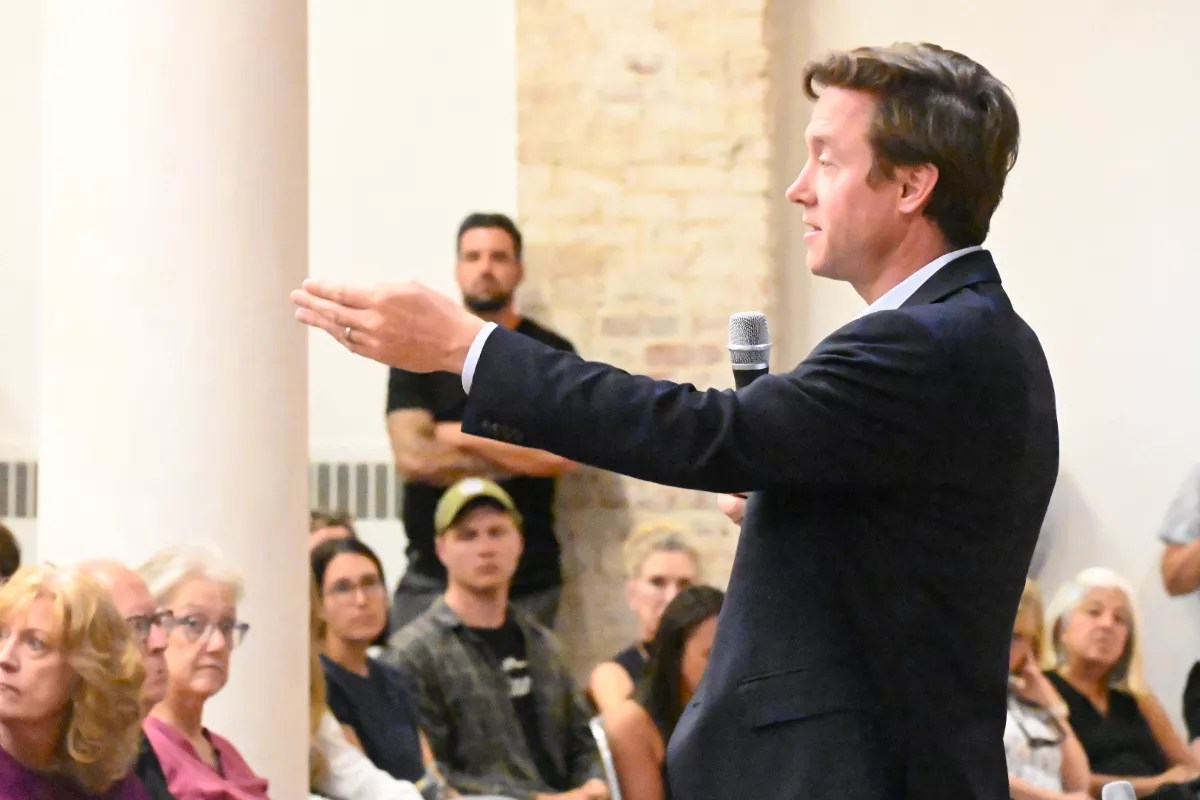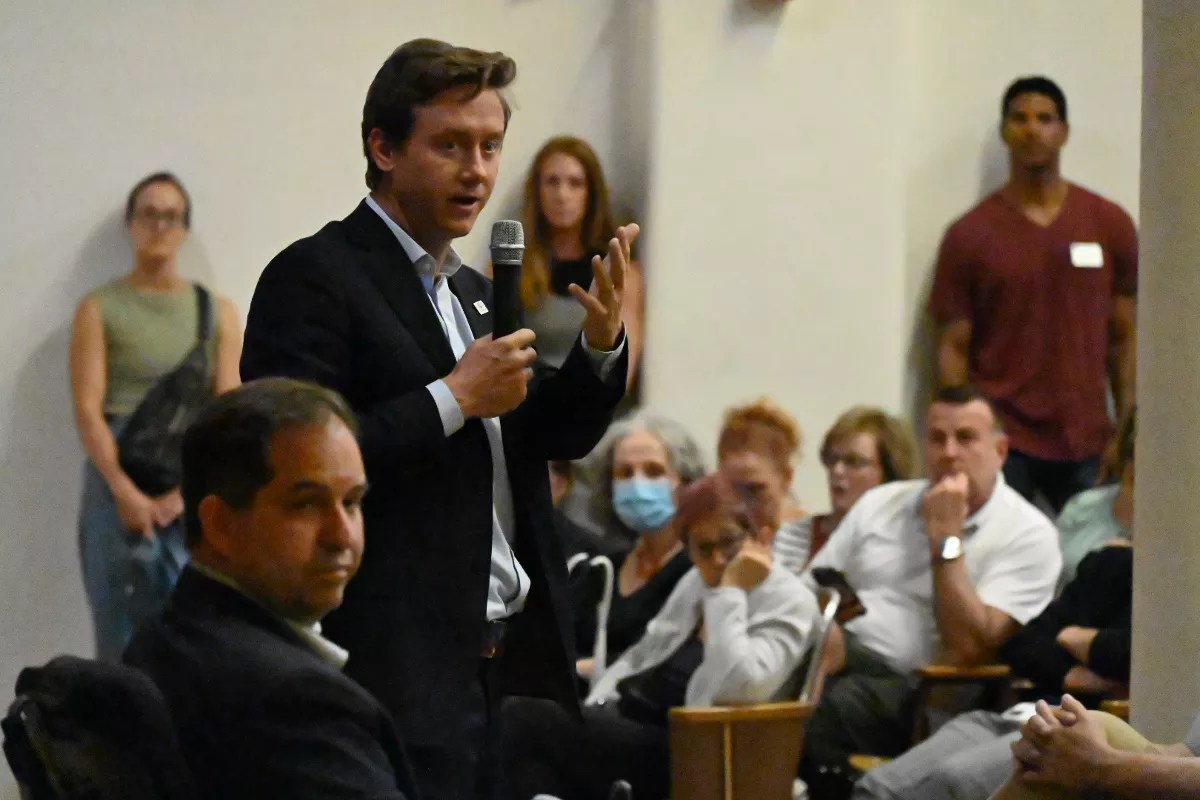
Bennito L. Kelty

Audio By Carbonatix
The first question Mayor Mike Johnston had to answer at his town hall in Denver’s Golden Triangle on Thursday, September 28, was the same question residents in the area have been asking all month long: Why does their tiny little neighborhood have to host not one, but two micro-communities?
“And one is right in the cultural center of the whole city,” griped one resident. “Is this a done deal?”
Although Golden Triangle residents already had a neighborhood meeting without Johnston on September 1, this was their first chance to voice their disapproval to his face. About 150 people attended.
Johnston started the town hall by reminding everyone that he wants to put micro-communities in all eleven of the Denver City Council districts – and that no, it isn’t a done deal – as the city continues to vet these sites and gather community feedback.
“We have proposed sites all around the city,” Johnston responded. “We’re going to sites in every council district; we will over time. We do have districts that have multiple sites.”
It was an answer that had been given by the city before, and some residents didn’t find it very satisfying.
Elaine Kamm, for instance, told Westword she thought the mayor completely missed the point.
“Don’t talk to me about districts. The district is huge,” she says. “The Golden Triangle is a sliver, a tiny part, of the whole district, and we’re getting two of these micro-communities. And it still doesn’t make sense to me why.”
Micro-communities are a central part of Johnston’s plan to house 1,000 homeless Denver residents by the end of the year. They include tiny homes or pallet shelters, and Johnston said that the two sites will each hold between 50 and 100 people.
The Golden Triangle is a state-certified creative district in City Council District 10, represented by Councilman Chris Hines, who was also present at the town hall. The boundaries of the district match up with the Civic Center, an official Denver neighborhood.
The creative district houses Denver’s top museums, chic cafes, bars and restaurants, and numerous city buildings – including a jail, the courthouse and the mayor’s offices in the Denver City and County Building. Its reputation as a cultural center for the Mile High City has left some residents concerned that the micro-communities will scare away tourists.
“It could have severe economic impact because of lost revenue, if the museums can’t attract as many people,” Kamm points out. “You’re going to have outside the wall, right there where you’re attracting tourists, people who are on meth, on fentanyl, who are not taking advantage [of services]. They don’t have to.”

About 150 people attended Mayor Mike Johnston’s town hall on Thursday to ask how micro-communities will affect their neighborhood in the Golden Triangle.
Bennito L. Kelty
Johnston added that picking the Golden Triangle ultimately had to do with where most homeless residents are found at the moment. “The highest density of people who are currently unsheltered right now are living in downtown Denver,” he said. “A thousand of those folks are right now within a square mile of where we’re sitting right now. All of those folks are going to be rehoused in this district as well as others within the city.”
Golden Triangle residents have been asking why they have to host two micro-communities – a potential burden that no other Denver neighborhood has so far been asked to bear – since Johnston publicly unveiled his planned eleven micro-community sites on August 25. Applause broke out on Thursday when one resident flat-out asked, “Why not try putting two in Cherry Creek?”
The mayor admits that the map of micro-community sites isn’t complete. Right now, it shows no planned micro-community locations in city council districts 1, 2 or 5 (where the Cherry Creek neighborhood is), despite Johnston’s repeated vows to put one in each district.
“District 10 is very large, and both of them are going in the Golden Triangle, which is like a smaller portion,” said one resident. “I’m just wondering why that was the choice.”
Johnston replied, “It really is a function of real estate opportunities we found that met the criteria. We were looking for places that have half-acre lots or larger, that boast connections to utilities, that are connected to public transit.”
The mayor’s office has already said that micro-community sites will have to meet a certain criteria, including proximity to transit, access to utilities, basic zoning and permitting criteria, basic environmental criteria, distance from schools and an equitable distribution across the city.
The two micro-community sites in the Golden Triangle are planned for 1199 Bannock Street and 1375 Elati Street.
The Elati Street site is owned by the City and County of Denver, while the Bannock Street location is owned by Urban Villages. However, Urban Villages has told Westword that it’s only in “early discussions” with the city about the site.
A couple of people at the helm of the discussions have supported Johnston during his campaign. One of the co-founders of Urban Villages, Grant McCargo, donated $500 to the mayor’s campaign on May 30. The president, Jon Buerge, donated $500 to Johnston’s campaign on May 23, though he also donated $500 to Leslie Herod on September 21, 2022.

Some residents who attended the mayor’s town hall on Thursday felt like they left without any new information about why their community will have two micro-communities.
Bennito L. Kelty
Jerrold Glick, another landowner offering his private property to the city for micro-communities, was in attendance at Thursday’s town hall. The site proposed at his property, at 5500 Yale Avenue, has also stirred neighborhood controversy for several hundred residents who now want to register with the city as an official organization just to protest it.
Although Glick refused to comment to Westword after the town hall, he did say during the meeting that he had “no idea what the city is going to do at that site” on Yale Avenue. Glick donated $10,000 to a Super PAC supporting Johnston, per city records.
Johnston reassured residents on Thursday that the micro-communities going in the Golden Triangle will be short-term – only meant to stay there for two or three years – and that there will be security on site. But residents are worried that there will be no background checks on the people going in, and no zero-tolerance policy on drugs and alcohol use.
Johnston said that they can’t do background checks “because many of the people who would be coming to these micro-community sites don’t have IDs.” He decided against a zero-tolerance policy on drugs after Houston – a model for reducing homelessness – reported that it can be counterproductive.
Some residents told Westword they thought the meeting didn’t offer much new information.
Nancy Ewing, who attended on Thursday and on September 1, said that she had hoped this town hall would focus on answering the questions they already asked earlier in the month. “I thought it was going to be answers to the questions that were noted in the last meeting,” Ewing said. “I didn’t know that we were going to hear all these questions that we’ve already asked all over again, and I still don’t feel like we have a lot of answers.”
The Golden Triangle will have another chance to make sense of the mayor’s plan on October 12, with another community meeting scheduled on the two micro-communities. Posters for the upcoming meeting refer to the sites as “Temporary Managed Communities.”
It will be the last gathering before the micro-communities open, should the mayor commit to using the neighborhood to house two sites.
Golden Triangle residents said on Thursday that they support the overall idea of micro-communities and the mayor’s efforts to solve homelessness, but are still concerned that their neighborhood doesn’t need two.
“We’re willing to try it and hope it succeeds,” Kamm says. “It’s not the concept that I don’t support, but to put a micro-community in this neighborhood, right in the cultural heart of the city, is not necessary.”